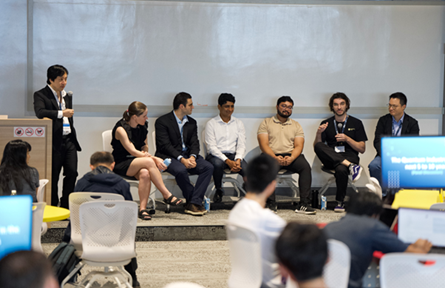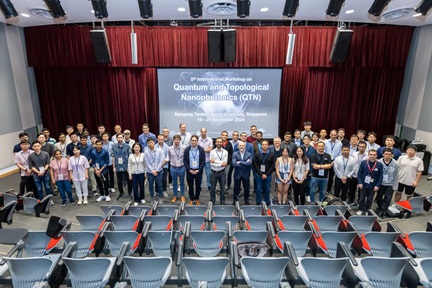A Casual Conversation on Science and Discovery with Nobel Laureate Prof Steven Chu
On 8 January 2025, following his highly anticipated public lecture, the Institute of Advanced Studies (IAS) at Nanyang Technological University hosted an intimate conversation session with Prof Steven Chu, Nobel Laureate in Physics (1997) and former U.S. Secretary of Energy. This session offered NTU scholars and PhD students a unique opportunity to engage directly with one of the most influential figures in modern science. The dialogue extended discussions from the earlier lecture, exploring themes such as interdisciplinary research, the role of science in policymaking, and the challenges of global sustainability.
The session opened with Prof Chu reflecting on his academic journey and personal experiences. With humour and candor, he recounted his upbringing in a family with a rich academic legacy. Despite this, he joked that science was rarely discussed at the dinner table. Instead, curiosity and determination led him to explore physics and later expand his work into biophysics, molecular biology, and energy science. He shared lighthearted anecdotes, including how he and his siblings playfully competed for the title of the family’s “black sheep,” which he claimed until his Nobel Prize. These personal stories drew laughter and set a lively, engaging tone for the dialogue.

Prof Chu reflecting on his academic journey and personal experiences during the dialogue session moderated by Prof Lydia Wong (Director, Global Alliance of Industries@NTU).
A significant portion of the discussion centered on Prof Chu’s tenure as former U.S. Secretary of Energy under then President Obama. He shared vivid accounts of his work to advance renewable energy, including the development of large-scale solar and wind farms. Prof Chu emphasised how he sought to demonstrate the economic viability of renewable energy projects, citing billion-dollar investments that encouraged private sector involvement. He also detailed how the Department of Energy’s loan program played a pivotal role in supporting electric vehicle companies, including Tesla, during their early struggles, helping them survive and eventually thrive.
When a Ph.D. student specialising in public policy asked how he managed to persuade skeptics in Congress and the energy industry to support renewable energy initiatives, Prof Chu responded candidly. He acknowledged the resistance to change but emphasised that presenting data and economic evidence was key to building trust. “You have to show them that it’s not just good for the environment - it’s good for the economy,” he explained. He recounted how he often defended investments in clean energy technologies by highlighting their potential to create jobs and reduce costs in the long term. His stories of navigating political hurdles captivated the audience, with students nodding in admiration.
Prof Chu also shared an anecdote about his efforts to secure funding for innovative clean energy projects during the financial crisis of 2008-2009. At that time, he was given an unprecedented USD 34 billion in discretionary funding to stimulate economic recovery while advancing green technologies. “I had to ensure that every dollar was used wisely,” he said. He recalled personally reviewing proposals and defending the decisions to skeptical members of Congress, emphasising long-term benefits over short-term political gains. The audience listened intently, many nodding in admiration of his ability to align scientific priorities with economic and political realities.
Another student, a young engineer interested in sustainable transportation, asked how he balanced investments between established technologies like wind and solar and riskier ventures such as biofuels and hydrogen energy. Prof Chu detailed the Department of Energy’s approach, explaining that while significant resources were directed toward proven technologies to achieve immediate impact, smaller funds were allocated to high-risk, high-reward research. He gave an example of how the department supported exploratory research into advanced battery technology, which has since contributed to the rapid growth of electric vehicles. “You have to invest in the present while preparing for the future,” he remarked, a statement that drew murmurs of agreement and scribbles in notebooks as students jotted down his insights.

Prof Chu engaged with enthusiastic audiences, sharing practical and empowering insights.
A pivotal moment came when a student posed a question about the role of artificial intelligence (AI) in sustainability. Prof Chu’s response was both insightful and balanced. He outlined several potential applications of AI, such as optimising traffic systems, refining climate models, and accelerating material discovery for clean energy technologies. However, he also cautioned against the significant energy demands of AI and stressed the importance of integrating physical principles into AI models to enhance their accuracy and relevance. This nuanced perspective sparked murmurs of interest and follow-up questions from the audience, with one participant later remarking, “It was eye-opening to hear both the opportunities and limitations of AI from someone who has such a broad perspective.”
When asked how he managed to transition seamlessly between disciplines, Prof Chu highlighted the importance of mastering core principles and collaborating with experts in unfamiliar fields. “Learn the fundamentals first,” he advised, “and don’t hesitate to seek out help from those who know more than you.” This advice encouraged many younger attendees, who later expressed their appreciation for his practical and empowering insights.
A Ph.D. candidate asked how Prof. Chu stayed motivated through setbacks and challenges. His response, blending humor with sincerity, drew laughter: “I love what I do - that’s the secret. When you’re passionate about your work, even failures become part of the fun.” He described how his setbacks often became learning opportunities that informed future successes. A particularly amusing anecdote involved him writing research papers late at night while serving as then U.S. Secretary of Energy, illustrating his enduring dedication to science even amidst demanding responsibilities.
Throughout the session, the audience’s enthusiasm was palpable. Students leaned forward in their seats, taking notes and exchanging excited glances during particularly resonant moments. The lively atmosphere reflected the value of the interaction, with attendees captivated by Prof Chu’s insights, humour, and humility.

The lively atmosphere showcased attendees' engagement with Prof Chu’s insights, humour, and humility.
The session concluded with warm applause as Prof Chu expressed his gratitude for the audience’s thoughtful questions and engagement. Attendees lingered after the event, discussing the ideas and lessons shared during the session. This informal yet intellectually stimulating dialogue deepened the understanding of the intersection between science, policy, and sustainability. It left attendees inspired by Prof Chu’s passion for using science to address global challenges and reaffirmed NTU’s commitment to fostering meaningful exchanges that empower the next generation of researchers.
Written by Qi Yuxia (PhD Student, School of Biological Sciences NTU)














/enri-thumbnails/careeropportunities1f0caf1c-a12d-479c-be7c-3c04e085c617.tmb-mega-menu.jpg?Culture=en&sfvrsn=d7261e3b_1)

/cradle-thumbnails/research-capabilities1516d0ba63aa44f0b4ee77a8c05263b2.tmb-mega-menu.jpg?Culture=en&sfvrsn=1bc94f8_1)






